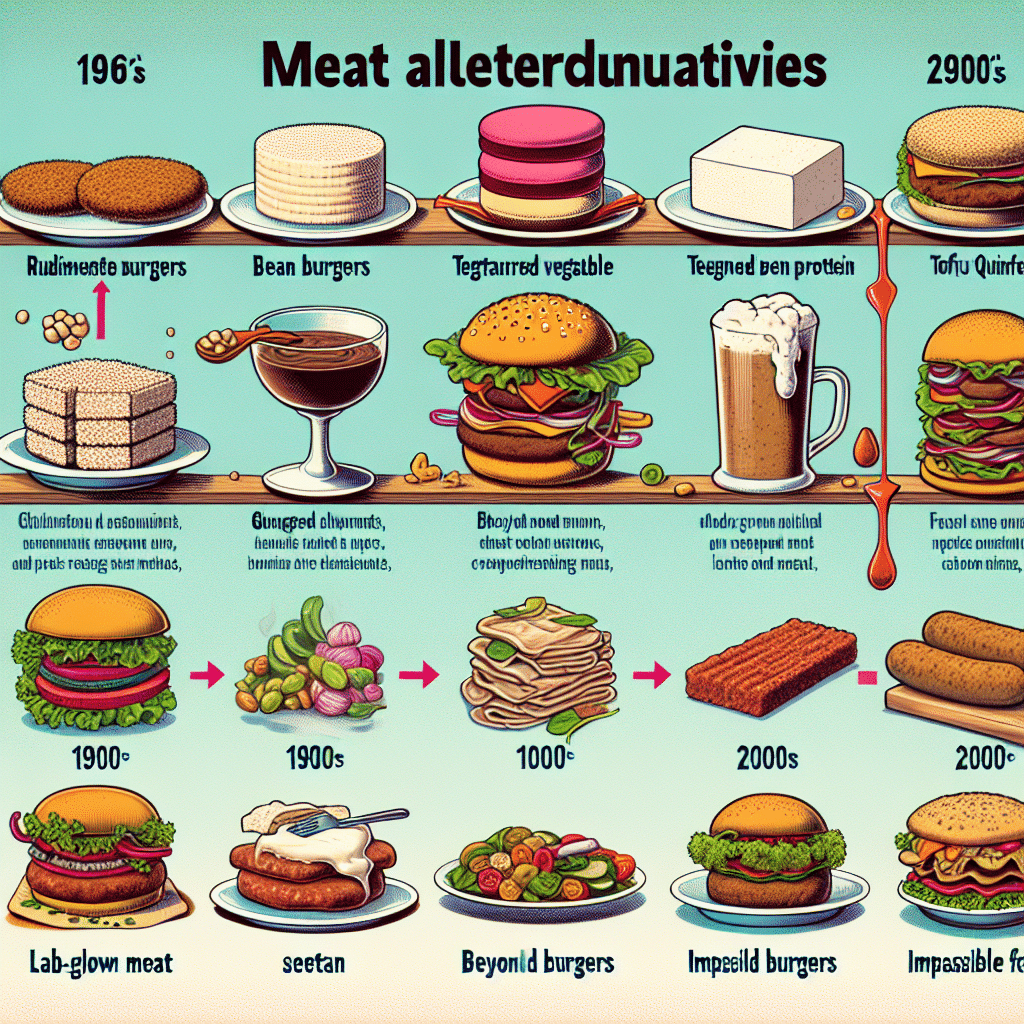Meat Alternatives: Evolving Trends in Meal Inclusions
-
Table of Contents
Meat Alternatives: Trends Shaping Future Meal Options
The global food landscape is undergoing a significant transformation as consumers increasingly seek out sustainable and health-conscious meal options. Meat alternatives have emerged as a pivotal player in this shift, offering a diverse range of products that cater to the evolving dietary preferences of a growing population. This article delves into the latest trends in meat alternatives and their impact on meal inclusions.
The Rise of Plant-Based Proteins
Plant-based proteins are at the forefront of the meat alternative movement. Derived from sources such as soy, peas, beans, and lentils, these proteins are designed to mimic the taste and texture of animal meat while providing nutritional benefits and reducing environmental impact.
- Health Benefits: Plant-based meats are often lower in saturated fat and cholesterol, making them a heart-healthy option.
- Environmental Impact: Producing plant-based proteins typically requires less water and land and generates fewer greenhouse gas emissions compared to traditional livestock farming.
- Innovation: Advances in food technology have led to products with improved taste and texture, making plant-based meats more appealing to a broader audience.
Lab-Grown Meat: A Technological Marvel
Cultured or lab-grown meat is another exciting development in the realm of meat alternatives. This process involves cultivating animal cells in a controlled environment to create meat that is genetically identical to its conventional counterpart without the need for raising and slaughtering animals.
- Animal Welfare: Lab-grown meat addresses ethical concerns related to animal welfare by eliminating the need for livestock farming.
- Food Security: Cultured meat has the potential to provide a stable supply of protein in regions where traditional meat production is not feasible.
- Regulatory Hurdles: While the technology is promising, lab-grown meat faces regulatory challenges and public skepticism that must be overcome before it can become a mainstream option.
Fermentation-Derived Proteins: The Next Frontier
Fermentation-derived proteins are produced using microorganisms such as yeast, fungi, or bacteria. This method can create high-quality proteins with a minimal environmental footprint.
- Sustainability: Fermentation requires less land and water than traditional agriculture and can be done locally, reducing transportation emissions.
- Scalability: Fermentation processes can be scaled up to meet growing demand without the same resource constraints as livestock farming.
- Diversity: A wide range of flavors and textures can be achieved through fermentation, offering exciting possibilities for new product development.
Insect Protein: An Emerging Trend
Insect protein is gaining attention as a highly sustainable and nutritious alternative to conventional meat. Insects like crickets and mealworms are rich in protein, vitamins, and minerals, and they require far fewer resources to farm than cattle or poultry.
- Cultural Acceptance: While common in many parts of the world, insects are a novel food source in Western countries, and their acceptance is growing as consumers become more adventurous.
- Efficiency: Insects have a high feed conversion rate, meaning they can convert feed into body mass more efficiently than traditional livestock.
- Regulatory Progress: As food authorities begin to recognize insects as a viable food source, more products are expected to enter the market.
Consumer Adoption and Market Growth
The success of meat alternatives hinges on consumer adoption. Factors influencing this include taste, price, availability, and awareness of the environmental and health benefits associated with these products.
- Market Growth: The global meat substitutes market is projected to continue its rapid growth, with significant investments flowing into the sector.
- Product Availability: Supermarkets and restaurants are expanding their offerings of meat alternatives, making them more accessible to consumers.
- Marketing and Education: Companies are investing in marketing campaigns and educational initiatives to inform consumers about the benefits of meat alternatives.
Conclusion
Meat alternatives are reshaping the culinary landscape, offering sustainable, nutritious, and ethical options for consumers. The evolution of plant-based proteins, lab-grown meats, fermentation-derived proteins, and insect protein reflects a broader trend towards environmentally friendly and health-conscious eating habits. As technology advances and consumer preferences shift, meat alternatives are poised to become an integral part of meal inclusions worldwide.
Discover ETChem’s Protein Products
For those interested in incorporating high-quality proteins into their products, ETChem offers a range of collagen solutions. Whether you’re developing food and beverage items, nutritional supplements, or health and wellness products, ETChem’s collagens provide the quality and versatility needed to meet consumer demands.
About ETChem:
ETChem, a reputable Chinese Collagen factory manufacturer and supplier, is renowned for producing, stocking, exporting, and delivering the highest quality collagens. They include marine collagen, fish collagen, bovine collagen, chicken collagen, type I collagen, type II collagen and type III collagen etc. Their offerings, characterized by a neutral taste, instant solubility attributes, cater to a diverse range of industries. They serve nutraceutical, pharmaceutical, cosmeceutical, veterinary, as well as food and beverage finished product distributors, traders, and manufacturers across Europe, USA, Canada, Australia, Thailand, Japan, Korea, Brazil, and Chile, among others.
ETChem specialization includes exporting and delivering tailor-made collagen powder and finished collagen nutritional supplements. Their extensive product range covers sectors like Food and Beverage, Sports Nutrition, Weight Management, Dietary Supplements, Health and Wellness Products, ensuring comprehensive solutions to meet all your protein needs.
As a trusted company by leading global food and beverage brands and Fortune 500 companies, ETChem reinforces China’s reputation in the global arena. For more information or to sample their products, please contact them and email karen(at)et-chem.com today.





